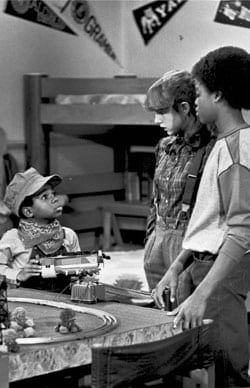
PROVO, Utah — Gary Coleman once said he wanted people to think of him as something more than the chubby-cheeked child star from the television show “Diff’rent Strokes,” that he wanted to escape the legacy of character Arnold Jackson, whose “Whatchu talkin’ ‘bout?” became a catch phrase of the 1970s and ‘80s.
He spent his later years still keeping a hand in show business, but also moving away from it, marrying and settling in Utah, far away from Hollywood’s sometimes all-too-bright lights. Still, he was dogged by ongoing health problems and struggled with legal woes.
After suffering a brain hemorrhage, Coleman was taken off life support Friday and died, his family and friends at his side, said Utah Valley Regional Medical Center spokeswoman Janet Frank. He was 42.
“He has left a lasting legacy,” tweeted singer Janet Jackson, who appeared on several episodes of “Diff’rent Strokes.” “I know he is finally at peace.”
Coleman chafed at his permanent association with “Diff’rent Strokes” but also tried to capitalize on it through reality shows and other TV appearances.
His former manager, Vic Perillo, called the diminutive star “everybody’s kid” and expressed regret for all the trouble that marked the end of Coleman’s life.
“It’s unfortunate that this young man should go down in history as someone that will be seen as bitter,” said Perillo, who helped launch Coleman’s career from Chicago in about 1977 and worked with him for 15 years. “If everybody knew what a joy he was and the joy he brought me … that’s kind of lost in all of this.”
Coleman suffered the brain hemorrhage Wednesday at his Santaquin home, 55 miles south of Salt Lake City. Frank said he was hospitalized because of an accident at the home, but she had no details.
“Diff’rent Strokes” debuted on NBC in 1978 and drew most of its laughs from Coleman, then a tiny 10-year-old with sparkling eyes and perfect comic timing.
He played the younger of two African American brothers adopted by a wealthy white man. Race and class relations became topics on the show as much as the typical trials of growing up.
“Diff’rent Strokes” lasted six seasons on NBC and two on ABC; it lives on thanks to DVDs and YouTube.
Coleman was born Feb. 8, 1968, in Zion, Ill., near Chicago.
His short stature — he reached only 4 feet 8 inches even in adulthood — added to his child-star charm but stemmed from a serious health problem, kidney failure. He got the first of at least two transplants at age 5 and required dialysis.
In a 1979 Los Angeles Times profile, his mother, Sue Coleman, said he always had been a ham. He acted in some commercials before he was signed by T.A.T., the production company that created “Diff’rent Strokes.”
After the show was canceled, Coleman continued to get credits for TV guest shots and other small roles over the years but never regained more than a shadow of his old popularity. At one point he worked as a security guard.
Coleman played upon his child-star image as he tried to resurrect his entertainment career in recent years, appearing on late-night shows and “The Surreal Life,” a VH1 show devoted to fading celebrities.
Coleman was among 135 candidates who ran in California’s bizarre 2003 recall election to replace then-Gov. Gray Davis, whom voters ousted in favor of Arnold Schwarzenegger. Coleman came in eighth with 12,488 votes, or 0.2 percent, just behind Hustler magazine publisher Larry Flynt.
Running for office gave him a chance to show another side of himself, he told The Associated Press at the time.
“This is really interesting and cool, and I’ve been enjoying the heck out of it because I get to be intelligent, which is something I don’t get to do very often,” he said.
Last fall, he had heart surgery complicated by pneumonia, said his Utah attorney, Randy Kester. In February, he suffered a seizure on the set of “The Insider.”
Legal disputes also dogged him. In 1989, when Coleman was 21, his mother filed a court request trying to gain control of her son’s $6 million fortune, saying he was incapable of handling his affairs. He said the move “obviously stems from her frustration at not being able to control my life.”
In a 1993 television interview, he said he tried to kill himself twice by overdosing on pills.
He moved to Utah in fall 2005, and according to a tally in early 2010, officers were called to assist or intervene with Coleman more than 20 times in the following years. They included a call where Coleman said he had taken dozens of Oxycontin pills and “wanted to die.”
Some of the disputes involved his wife, Shannon Price, whom he met on the set of the 2006 comedy “Church Ball” and married in 2007.
In September 2008, a dustup with a fan at a Utah bowling alley led Coleman to plead no contest to disorderly conduct. The fan filed a lawsuit claiming that the actor punched him and ran into him with his truck; the suit was settled out of court.
In February — on his 42nd birthday — he pleaded guilty to a misdemeanor criminal mischief charge related to an April 2009 domestic violence incident at his home.
Associated Press Writer Doug Alden, AP Entertainment Writer Sandy Cohen and AP Movie Writer Christy Lemire contributed to this story.


![Banner [Virtual] Art Gallery](https://baystatebanner.com/wp-content/uploads/2024/04/Cagen-Luse_Men-at-store-e1713991226112-150x150.jpg)

![Banner [Virtual] Art Gallery](https://baystatebanner.com/wp-content/uploads/2024/04/Cagen-Luse_Men-at-store-e1713991226112-848x569.jpg)

